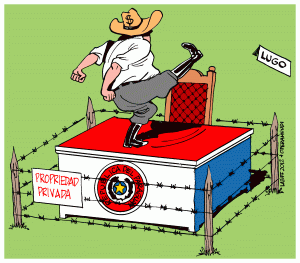 Throughout the 20th century Latin America was notorious throughout the world for its military coups. The military repeatedly intervened in almost every country in the region, almost always to protect vested interests. Very often the coup was supported or even initiated by the United States.
Throughout the 20th century Latin America was notorious throughout the world for its military coups. The military repeatedly intervened in almost every country in the region, almost always to protect vested interests. Very often the coup was supported or even initiated by the United States.
Over the last 30 years, as democracy has consolidated in the region, it has seemed as if the era of the coup is over. But is this actually the case? Several Argentine analysts are suggesting that all that has happened is that the coup has gained a new façade of respectability. Juan Gabriel Tokatlian, writing in La Nación, puts it like this:
“The ‘nuevo golpismo’ [the new form of coup] is formally less violent, is led by civilians (with the implicit or explicit support of the military), maintains a certain veneer of institutional propriety, doesn’t necessarily involve a foreign power (the USA) and claims to be resolving a potential damaging political or social impasse.”
Iñigo Errejón and Alfredo Serrano, writing in Página12, believe that the new-style coups are defending vested interests in the same way as the old-style military coups:
“The progressive governments in Latin America share, to a different extent and with different degrees of intensity, a ‘post-neoliberal’ regional agenda of recovering national sovereignty, promoting region integration, including excluded groups and combating poverty and inequality. Generally the new executive powers have emerged after a prolonged political crisis and they come to power enshrining the hopes of the oppressed classes.”
The new, elected governments clash with the ‘counter-majority’ powers, which, although they have lost part of their electoral force, still have considerable power through their domination of the media, the chambers of commerce and other special bodies. The legislative powers, where these old elites are often well represented, frequently become the standard bearers of these old, vested interests. It is this way, they say, that they are able to carry out – or attempt to carry out – coups which have veneer of respectability.
Similar discussions are occurring in Brazil. One of the leading PT thinkers, Tarso Genro, wrote in Brasil de Fato:
“What happened in Paraguay was a ‘new style’ coup d’état, which overthrew a legitimately elected government through a right-wing conspiracy, dominant in both chambers of Congress. It managed to overthrow Lugo while the elite in our country tried but failed to overthrow Lula. It succeeded there because President Lugo never had solid party support and was isolated from the traditional system of power, made up of traditional parties, that never accepted the arrival in the presidency of a bishop linked to social movements. The conspiracy against Lugo was in the presidential palace, through the Vice-President who now, ‘surprised’, takes over the government, with the support of parliamentary leaders who certainly will ‘help’ him to govern democratically.
Iñigo Errejón and Alfredo Serrano identify five attempts to get rid of rulers and to restore the oligarchical order: the failed coup attempts in Venezuela in 2002, Bolivia 2008 and Ecuador in 2010; and the successful coups in Honduras in 2009 and Paraguay in 2012. Juan Gabriel Tokatlian adds a sixth: the successful ousting of Jean-Bertrand Aristide in Haiti in 2004.
The overthrow of Lugo presents a real challenge to the regional bodies: CELAC, which is attempting to replace the OAS as the main spokesman for Latin America, UNASUR and MERCOSUR. Juan Gabriel Tokatlian writes:
“MERCOSUR faces a real challenge: for the first time this century ‘nuevo golpismo’ has arisen in the South Cone with all its repercussions. Argentina must raise its profile significantly in the Paraguayan case: sophisticated and constructive diplomacy is needed to prevent the spectre of the ‘nuevo golpismo’ getting a firm footing in South America.”
The same could be said about the Brazilian government. Today Brazil is a powerful economic influence in Paraguay, more powerful than Argentina. Although President Dilma Rousseff initially criticised the way Lugo was ousted, she is now under heavy pressure from brasilguaios, Brazilian farmers who own extensive soya plantations in Paraguay. They have sent two large delegations to Brasilia to urge Dilma to recognise the new government.
The analysis emerging from Argentina and Brazil underlines the difficulties that Latin America faces in constructing a real alternative to neoliberalism. While the left all over the world has reacted with delight at the electoral victories of leftish candidates in a host of South American countries, taking over government is only the beginning of a long, arduous and risky process. There are numerous problems. Political and economic power has to be wrested away from an entrenched elite, skilled at adapting to changed times. The difficulties of working within coalition governments have to be navigated. State power, weakened by decades of savage neoliberalism, has to be strengthened, as it is the only tool available to the governments for redistributing power. Perhaps, as these discussions of Paraguay show, the most hopeful sign is the growing awareness on the left of the scale of the challenge.

